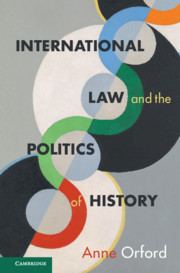11 results
Chapter 1 - Pocock, Skinner, and the “Historiographical Revolution”
-
- Book:
- Intellectual History and the Problem of Conceptual Change
- Published online:
- 02 May 2024
- Print publication:
- 09 May 2024, pp 9-37
-
- Chapter
- Export citation
Introduction
-
- Book:
- The Body Politic in Roman Political Thought
- Published online:
- 01 February 2024
- Print publication:
- 08 February 2024, pp 1-28
-
- Chapter
- Export citation
9 - A Strong, Deeply Felt, Social Concern
-
-
- Book:
- Pasinetti and the Classical Keynesians
- Published online:
- 17 February 2022
- Print publication:
- 24 February 2022, pp 233-258
-
- Chapter
- Export citation
8 - The History of Concepts
-
- Book:
- History and Identity
- Published online:
- 04 February 2022
- Print publication:
- 20 January 2022, pp 179-202
-
- Chapter
- Export citation
4 - History’s Lawyers
-
- Book:
- International Law and the Politics of History
- Published online:
- 18 June 2021
- Print publication:
- 05 August 2021, pp 105-177
-
- Chapter
- Export citation
3 - History and the Turn to the International
-
- Book:
- International Law and the Politics of History
- Published online:
- 18 June 2021
- Print publication:
- 05 August 2021, pp 70-104
-
- Chapter
- Export citation

International Law and the Politics of History
-
- Published online:
- 18 June 2021
- Print publication:
- 05 August 2021
Part V - Is a New Paradigm Possible?
-
- Book:
- The Age of Fragmentation
- Published online:
- 25 November 2019
- Print publication:
- 05 December 2019, pp 287-376
-
- Chapter
- Export citation
12 - Post-Keynesian Macroeconomics
- from Part V - Is a New Paradigm Possible?
-
- Book:
- The Age of Fragmentation
- Published online:
- 25 November 2019
- Print publication:
- 05 December 2019, pp 289-318
-
- Chapter
- Export citation
Chapter 7 - Pound and Influence
- from Part I - Pound’s Texts
-
-
- Book:
- The New Ezra Pound Studies
- Published online:
- 17 October 2019
- Print publication:
- 07 November 2019, pp 104-124
-
- Chapter
- Export citation
Part I - Pound’s Texts
-
- Book:
- The New Ezra Pound Studies
- Published online:
- 17 October 2019
- Print publication:
- 07 November 2019, pp 7-124
-
- Chapter
- Export citation

